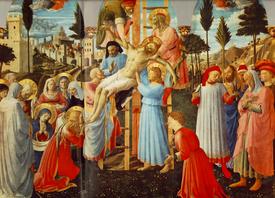 St Catherine of Siena Church and Priory has announced its liturgical program for the sacred Triduum Services (Holy Thursday, Good Friday, Holy Saturday and Easter Sunday).
St Catherine of Siena Church and Priory has announced its liturgical program for the sacred Triduum Services (Holy Thursday, Good Friday, Holy Saturday and Easter Sunday).
Tag: Sacred Triduum
Covering statues, images & crucifixes in Passiontide
My friend George asked me the other day about the
tradition of covering the statues, images and crucifixes (sacred images) -but
not the Stations of the Cross–before Holy Week. He told me that the nuns told
him that the Church covered sacred items because Christ went into hiding before
his arrest. Well, that’s true but incomplete. The tradition of veiling finds
its source in John 8:46-59 where the Jews attempt to stone Jesus because of his
claims of being the Son of God, but he hides from view. As point of comparison,
you will notice in Mark’s gospel our focus is on the Lord’s crucifixion because
it is there that we learn the true identity of Jesus as being man and divine.
The covering of sacred images, therefore, is to illustrate the increasing
tension we find ourselves in the Liturgy as we move toward of the Lord’s own
Paschal Mystery. The veiling actually reinforces the verifiable fact of the
Incarnation.
Continue reading Covering statues, images & crucifixes in Passiontide
Exult you angels, exult you Church, exult all creation: Christ is Risen!
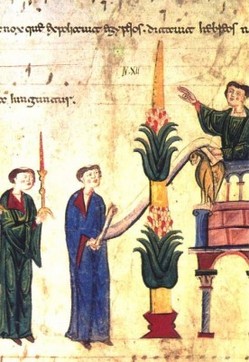 Exult now O you angelic throngs of the heavens:
Exult now O you angelic throngs of the heavens:
Exult O you divine mysteries: and let the saving trumpet resound for the victory of so great a King. Let the earthly realm also be joyful, made radiant by such flashings like lightning: and, made bright with the splendor of the eternal King, let it perceive that it has dismissed the entire world’s gloom.
Let Mother Church rejoice as well, adorned with the blazes of so great a light: and let this royal hall ring with the great voices of the peoples. Wherefore, most beloved brothers and sisters, you here present to such a wondrous brightness of this holy light, I beseech you, together with me invoke the mercy of Almighty God.
Let Him who deigned to gather me in among the number of the Levites, by no merits of mine, while pouring forth the glory of His own light enable me to bring to fullness the praise of this waxen candle.
Deacon: The Lord be with you!
Response: And with your spirit!
D: Raise your hearts on high!
R: We now have them present to the Lord!
D: Let us then give thanks to the Lord our God!
R: This is worthy and just!
Truly it is worthy and just to resound forth with the whole of the heart, disposition of mind, and by the ministry of the voice, the invisible God the Father Almighty, and His Only-begotten Son our Lord Jesus Christ, Who, on our behalf, resolved Adam’s debt to the Eternal Father and cleansed with dutiful bloodshed the bond of the ancient crime.
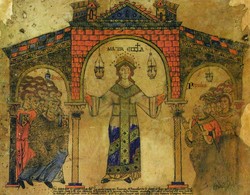 For these are the Paschal holy days, in which that true Lamb is slain, by Whose Blood the doorposts of the faithful are consecrated.
For these are the Paschal holy days, in which that true Lamb is slain, by Whose Blood the doorposts of the faithful are consecrated.
This is the night in which first of all You caused our forefathers, the children of Israel brought forth from Egypt, to pass dry shod through the Red Sea. This is the night which purged the darkness of sins by the illumination of the pillar. This is the night which today restores to grace and unites in sanctity throughout the world Christ’s believers, separated from the vices of the world and the darkness of sins. This is the night in which, once the chains of death were undone, Christ the victor arose from the nether realm. For it would have profited us nothing to have been born, unless it had been fitting for us to be redeemed.
Continue reading Exult you angels, exult you Church, exult all creation: Christ is Risen!
Holy Saturday
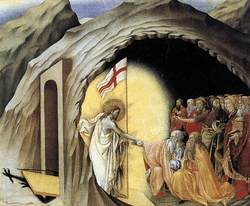 LET me tell you right now,
LET me tell you right now,
No one suffered more on Good Friday
And deserves a rest today
Than the King of the Jews-
And right now he’s in hell.
He descended into hell
Where he is right now.
And right now he is being himself,
He’s being his God-from-heaven-descended self,
And I’ll bet you that it’s a real blast in hell
With him there
And I’ll bet he’s in there
And having a ball.
He’s redeeming hell
By his sky-high dream-drawn scheme
Of simply being himself
And accepting selves’ selves
And offering himself to God-on-high for them.
The spirituality of Holy Saturday
There was a day when Nietzsche was right: God was dead, the Word was not heard in the world, the body was interred and the tomb sealed up, the soul descended into the bottomless abyss of Sheol.” This descent of Jesus into the kingdom of the dead “was part of his abasement even if (as St. John admits of the Cross) this supreme abasement is already surrounded by the thunderbolts of Easter night. In fact, did not the very descent to hell bring redemption to the souls there?” It prolonged in some manner the cry from the Cross: Why have you abandoned me? “Nobody could ever shout that cry from a deeper abyss than did he whose life was to be perpetually born of the Father.”
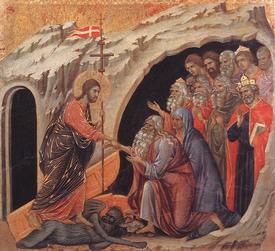 But there remains the imitation of Christ. There is a participation, not only sacramental, but contemplative in his mystery. There is an experience of the abandonment on the Cross and the descent into hell, and experience of the poena damni. There is the crushing feeling of the “ever greater dissimilarity” of God in the resemblance, however great, between him and the creature; there is the passage through death and darkness, the stepping through “the somber door”. In conformity to the mission he has received, the prayerful man then experiences the feeling that “God is dead for him”. And this is a gift of Christian grace — but one receives it unawares. The lived and felt faith, charity, and hope rise above the soul to an inaccessible place, to God. From then on it is “in nakedness, poverty and humiliation” that the soul cries out to him.
But there remains the imitation of Christ. There is a participation, not only sacramental, but contemplative in his mystery. There is an experience of the abandonment on the Cross and the descent into hell, and experience of the poena damni. There is the crushing feeling of the “ever greater dissimilarity” of God in the resemblance, however great, between him and the creature; there is the passage through death and darkness, the stepping through “the somber door”. In conformity to the mission he has received, the prayerful man then experiences the feeling that “God is dead for him”. And this is a gift of Christian grace — but one receives it unawares. The lived and felt faith, charity, and hope rise above the soul to an inaccessible place, to God. From then on it is “in nakedness, poverty and humiliation” that the soul cries out to him.
Those who have experienced such states afterwards, more often than not, in their humility, see nothing in them but a personal purification. True to his doctrine which refuses to separate charisms and gifts of the Holy Spirit, the ecclesial mission, and individual mysticism, von Balthasar discerns in it essentially this “Holy Saturday of contemplation” by which the Betrothed, in some chosen few of her members, is made to participate more closely in the redemption wrought by the Spouse. We have arrived at a time in history when human consciousness, enlarged and deepened by Christianity, inclines more and more to this interpretation.
The somber experience of Holy Saturday is the price to be paid for the dawn of the new spring of hope, this spring which has been “canonized in the rose garden of Lisieux”: “is it not the beginning of a new creation? The magic of Holy Saturday … Deep cave from which the water of life escapes.”
Reading so many passages where this theme is taken up, we discern a distress, a solitude, a night — of the quality, in fact, as that experienced by “the Heart of the world” — and we understand that a work that communicates so full a joy must have been conceived in that sorrow.
Cardinal Henri de Lubac on the work of Cardinal Hans Urs von Balthasar
Father, into your hands I commend my spirit
“I called to the Lord, out of my distress,
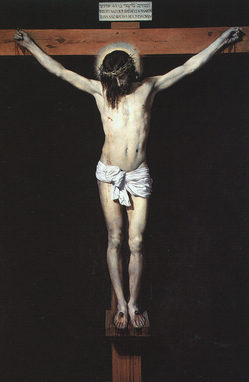 and he answered me; out of the belly of Sheol I cried, and thou didst hear my voice. For thou didst cast me into the deep, into the heart of the seas, and the flood was round about me; all thy waves and thy billows passed over me. Then I said, ‘I am cast out from thy presence; how shall I again look upon thy holy temple?’
and he answered me; out of the belly of Sheol I cried, and thou didst hear my voice. For thou didst cast me into the deep, into the heart of the seas, and the flood was round about me; all thy waves and thy billows passed over me. Then I said, ‘I am cast out from thy presence; how shall I again look upon thy holy temple?’
The waters closed in over me, the deep was round about me; weeds were wrapped about my head at the roots of the mountains. I went down to the land whose bars closed upon me for ever; yet thou didst bring up my life from the Pit, O Lord my God.
When my soul fainted within me, I remembered the Lord; and my prayer came to thee, into thy holy temple. Those who pay regard to vain idols forsake their true loyalty. But I with the voice of thanksgiving will sacrifice to thee; what I have vowed I will pay. Deliverance belongs to the Lord!”
(Jonah 2:1-9)
There was darkness over the whole land…while the sun’s light failed; and the curtain of the temple was torn in two. Then Jesus, crying with a loud voice, said, “Father, into your hands I commend my spirit.” [Luke 23:44b-46a]
Without the Cross & the Resurrection we have atheism in Christianity
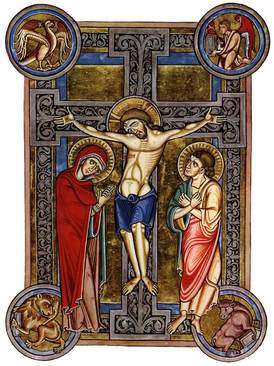 But what Christ did on the Cross was in no way intended to spare us death but rather to revalue death completely. In place of the “going down into the pit” of the Old Testament, it became “being in paradise tomorrow”. Instead of fearing death as the final evil and begging God for a few more years of life, as the weeping king Hezekiah does, Paul would like most of all to die immediately in order “to be with the Lord” (Phil 1:23). Together with death, life is also revalued: “If we live, we live to the Lord; if we die, we die to the Lord” (Rom 14:8).
But what Christ did on the Cross was in no way intended to spare us death but rather to revalue death completely. In place of the “going down into the pit” of the Old Testament, it became “being in paradise tomorrow”. Instead of fearing death as the final evil and begging God for a few more years of life, as the weeping king Hezekiah does, Paul would like most of all to die immediately in order “to be with the Lord” (Phil 1:23). Together with death, life is also revalued: “If we live, we live to the Lord; if we die, we die to the Lord” (Rom 14:8).
But the issue is not only life and death but our existence before God and our being judged by him. All of us were sinners before him and worthy of condemnation. But God “made the One who knew no sin to be sin, so that we might be justified through him in God’s eyes” (2 Cor 5:21).
Only God in his absolute freedom can take hold of our finite freedom from within in such a way as to give it a direction toward him, an exit to him, when it was closed in on itself. This happened in virtue of the “wonderful exchange” between Christ and us: he experiences instead of us what distance from God is, so that we may become beloved and loving children of God instead of being his “enemies” (Rom 5:10).
Continue reading Without the Cross & the Resurrection we have atheism in Christianity
“GOOD FRIDAY”
Am I a stone, and not a sheep,
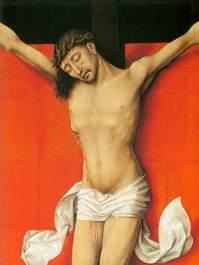 That I can stand, O Christ, beneath Thy cross,
That I can stand, O Christ, beneath Thy cross,
To number drop by drop Thy Blood’s slow loss,
And yet not weep?
Not so those women loved
Who with exceeding grief lamented Thee;
Not so fallen Peter weeping bitterly;
Not so the thief was moved;
Not so the Sun and Moon
Which hid their faces in a starless sky.
A horror of great darkness at broad noon –
I, only I.
Yet give not o’er
But seek Thy sheep, true Shepherd of the flock;
Greater than Moses, turn and look once more
And smite a rock.
Christina Rossetti
Church visits on Holy Thursday
![]() It is customary to visit the special altars created for the reserved Eucharist after the Holy Thursday Mass of the Lord’s Supper, the birth of the holy priesthood and the giving of the Eucharist as the supreme gift Love to the Church. There we spend time in prayer for ourselves and for those we’ve promised to pray. Keeping watch is an act of love and penance with the goal of remaining close to the Lord. From time immemorial we learn how to keep vigil by making visits to three or seven nearby churches as a “mini-pilgrimage.” Tradition tells us that Saint Philip Neri is credited with popularizing the Roman practice of a pilgrimage to seven churches to keep people attentive to the presence of the Lord in the Eucharist, plus to keep them out of trouble. The point of this pious and noble exercise is to keep vigil with the Lord as the disciples tried to do so in the Garden of Gethsemani before the Lord’s arrest. I will be visiting at least three perhaps seven churches. One can’t always find the churches open into the night even on Holy Thursday.
It is customary to visit the special altars created for the reserved Eucharist after the Holy Thursday Mass of the Lord’s Supper, the birth of the holy priesthood and the giving of the Eucharist as the supreme gift Love to the Church. There we spend time in prayer for ourselves and for those we’ve promised to pray. Keeping watch is an act of love and penance with the goal of remaining close to the Lord. From time immemorial we learn how to keep vigil by making visits to three or seven nearby churches as a “mini-pilgrimage.” Tradition tells us that Saint Philip Neri is credited with popularizing the Roman practice of a pilgrimage to seven churches to keep people attentive to the presence of the Lord in the Eucharist, plus to keep them out of trouble. The point of this pious and noble exercise is to keep vigil with the Lord as the disciples tried to do so in the Garden of Gethsemani before the Lord’s arrest. I will be visiting at least three perhaps seven churches. One can’t always find the churches open into the night even on Holy Thursday.
Pope Benedict’s homily for Holy Thursday 2009
Qui, pridie quam pro nostra omniumque salute pateretur, hoc est hodie, accepit panem: [Who, the day before he suffered for the salvation of us and of all — that is, today — he took the bread:] these words we shall pray today in the Canon of the Mass. “Hoc est hodie” [“That is, today”] – the Liturgy of Holy Thursday places the word “today” into the text of the prayer, thereby emphasizing the particular dignity of this day. It was “today” that He did this: he gave himself to us for ever in the Sacrament of his Body and Blood. This “today” is first and foremost the memorial of that first Paschal event. Yet it is something more. With the Canon, we enter into this “today”. Our today comes into contact with his today. He does this now. With the word “today”, the Church’s Liturgy wants us to give great inner attention to the mystery of this day, to the words in which it is expressed. We therefore seek to listen in a new way to the institution narrative, in the form in which the Church has formulated it, on the basis of Scripture and in contemplation of the Lord himself.
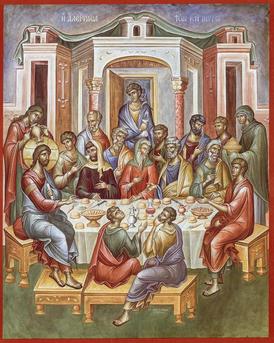 The first thing to strike us is that the institution narrative is not an independent phrase, but it starts with a relative pronoun: qui pridie. This “qui” connects the entire narrative to the preceding section of the prayer, “let it become for us the body and blood of Jesus Christ, your only Son, our Lord.” In this way, the institution narrative is linked to the preceding prayer, to the entire Canon, and it too becomes a prayer. By no means is it merely an interpolated narrative, nor is it a case of an authoritative self-standing text that actually interrupts the prayer. It is a prayer. And only in the course of the prayer is the priestly act of consecration accomplished, which becomes transformation, transubstantiation of our gifts of bread and wine into the Body and Blood of Christ. As she prays at this central moment, the Church is fully in tune with the event that took place in the Upper Room, when Jesus’ action is described in the words: “gratias agens benedixit – he gave you thanks and praise”. In this expression, the Roman liturgy has made two words out of the one Hebrew word berakha, which is rendered in Greek with the two terms eucharistía and eulogía. The Lord gives thanks. When we thank, we acknowledge that a certain thing is a gift that has come from another. The Lord gives thanks, and in so doing gives back to God the bread, “fruit of the earth and work of human hands”, so as to receive it anew from him. Thanksgiving becomes blessing. The offering that we have placed in God’s hands returns from him blessed and transformed. The Roman liturgy rightly interprets our praying at this sacred moment by means of the words: “through him, we ask you to accept and bless these gifts we offer you in sacrifice”. All this lies hidden within the word “eucharistia”.
The first thing to strike us is that the institution narrative is not an independent phrase, but it starts with a relative pronoun: qui pridie. This “qui” connects the entire narrative to the preceding section of the prayer, “let it become for us the body and blood of Jesus Christ, your only Son, our Lord.” In this way, the institution narrative is linked to the preceding prayer, to the entire Canon, and it too becomes a prayer. By no means is it merely an interpolated narrative, nor is it a case of an authoritative self-standing text that actually interrupts the prayer. It is a prayer. And only in the course of the prayer is the priestly act of consecration accomplished, which becomes transformation, transubstantiation of our gifts of bread and wine into the Body and Blood of Christ. As she prays at this central moment, the Church is fully in tune with the event that took place in the Upper Room, when Jesus’ action is described in the words: “gratias agens benedixit – he gave you thanks and praise”. In this expression, the Roman liturgy has made two words out of the one Hebrew word berakha, which is rendered in Greek with the two terms eucharistía and eulogía. The Lord gives thanks. When we thank, we acknowledge that a certain thing is a gift that has come from another. The Lord gives thanks, and in so doing gives back to God the bread, “fruit of the earth and work of human hands”, so as to receive it anew from him. Thanksgiving becomes blessing. The offering that we have placed in God’s hands returns from him blessed and transformed. The Roman liturgy rightly interprets our praying at this sacred moment by means of the words: “through him, we ask you to accept and bless these gifts we offer you in sacrifice”. All this lies hidden within the word “eucharistia”.
Continue reading Pope Benedict’s homily for Holy Thursday 2009